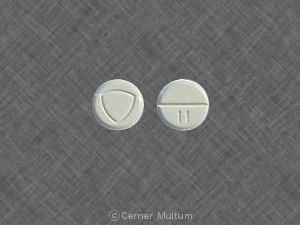Akineton HCl and Alcohol/Food Interactions
There are 2 alcohol/food/lifestyle interactions with Akineton HCl (biperiden).
Biperiden Alcohol (Ethanol)
Moderate Drug Interaction
Ask your doctor before using biperiden together with ethanol (alcohol). Use alcohol cautiously. Alcohol may increase drowsiness and dizziness while you are taking biperiden. You should be warned not to exceed recommended dosages and to avoid activities requiring mental alertness. If your doctor prescribes these medications together, you may need a dose adjustment to safely take this combination. It is important to tell your doctor about all other medications you use, including vitamins and herbs. Do not stop using any medications without first talking to your doctor.
Switch to professional interaction data
Biperiden High Blood Pressure (Hypertension)
Minor Potential Hazard, Moderate plausibility
anticholinergics - hypertension
Cardiovascular effects of anticholinergics may exacerbate hypertension. Therapy with anticholinergic agents should be administered cautiously in patients with hypertension.
Switch to professional interaction data
Akineton HCl drug interactions
There are 335 drug interactions with Akineton HCl (biperiden).
Akineton HCl disease interactions
There are 10 disease interactions with Akineton HCl (biperiden) which include:
- autonomic neuropathy
- GI obstruction
- glaucoma
- obstructive uropathy
- tardive dyskinesia
- infectious diarrhea
- cardiac disease
- liver disease
- hypertension
- hyperthyroidism
More about Akineton HCl (biperiden)
- Check interactions
- Compare alternatives
- Drug images
- Side effects
- Dosage information
- During pregnancy
- Drug class: anticholinergic antiparkinson agents
Related treatment guides
Drug Interaction Classification
| Highly clinically significant. Avoid combinations; the risk of the interaction outweighs the benefit. | |
| Moderately clinically significant. Usually avoid combinations; use it only under special circumstances. | |
| Minimally clinically significant. Minimize risk; assess risk and consider an alternative drug, take steps to circumvent the interaction risk and/or institute a monitoring plan. | |
| No interaction information available. |
See also:
Further information
Always consult your healthcare provider to ensure the information displayed on this page applies to your personal circumstances.


